General Sir John Monash, Personal Files Book 18, 25 May - 3 June 1918, Part 3
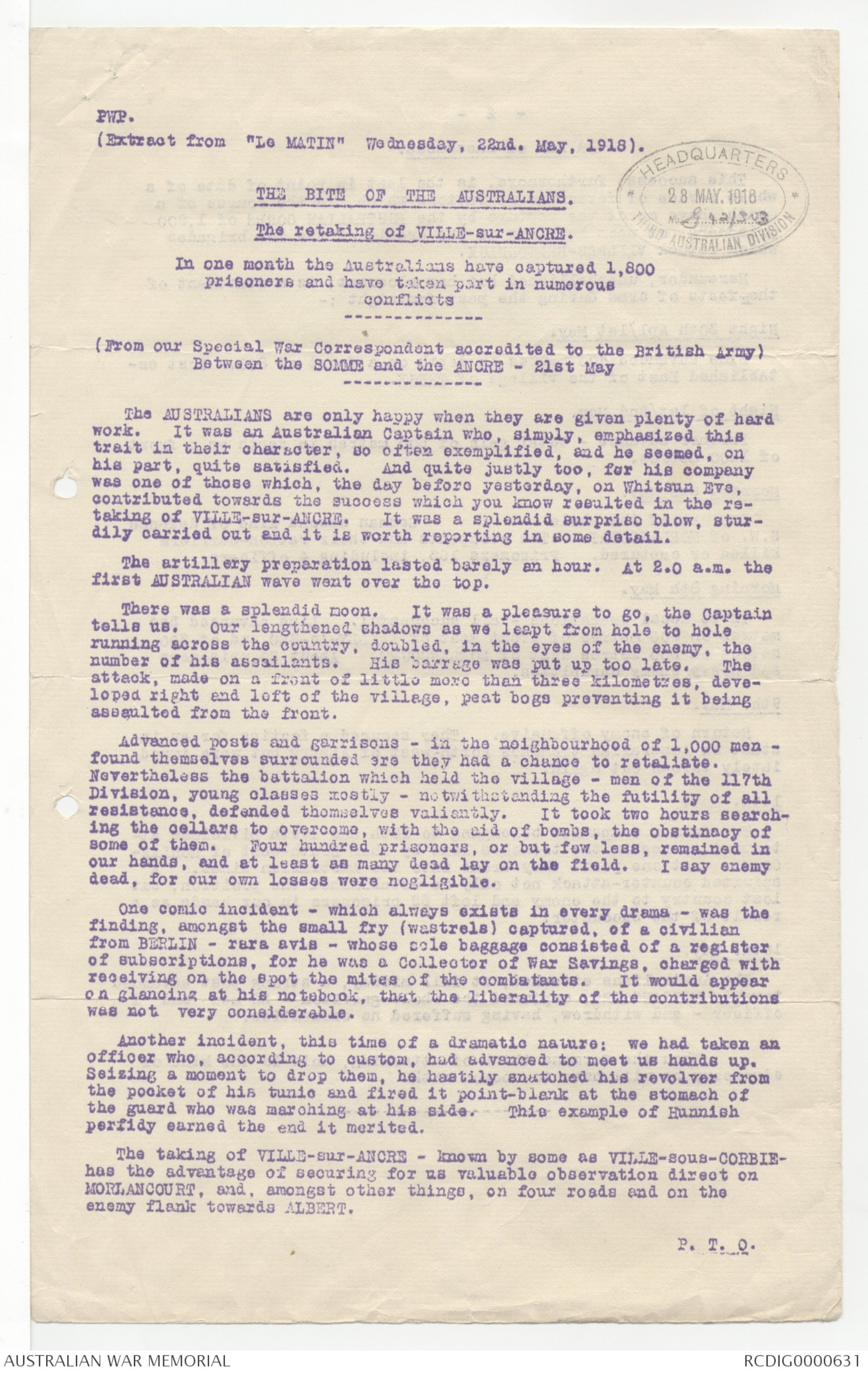
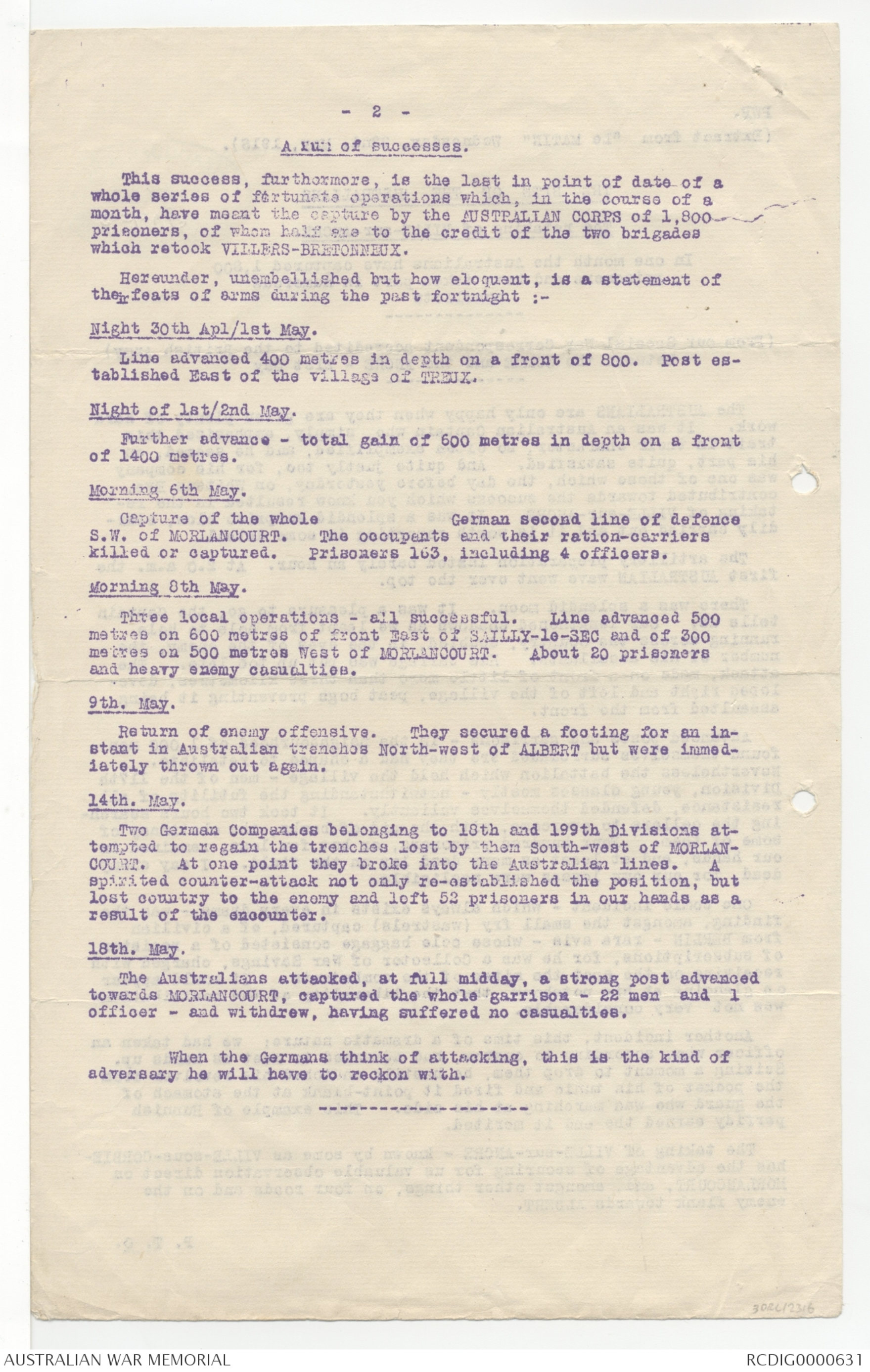
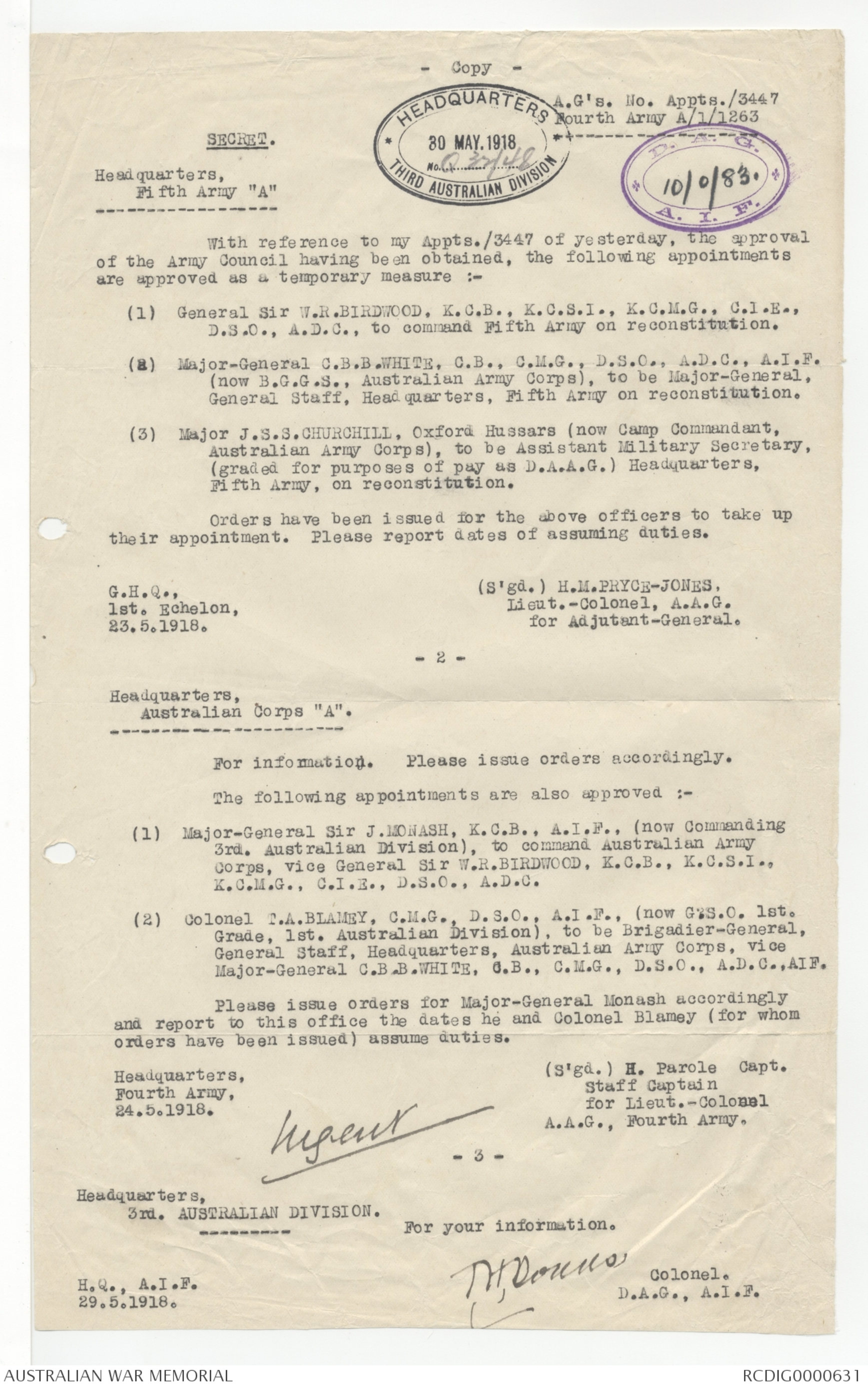
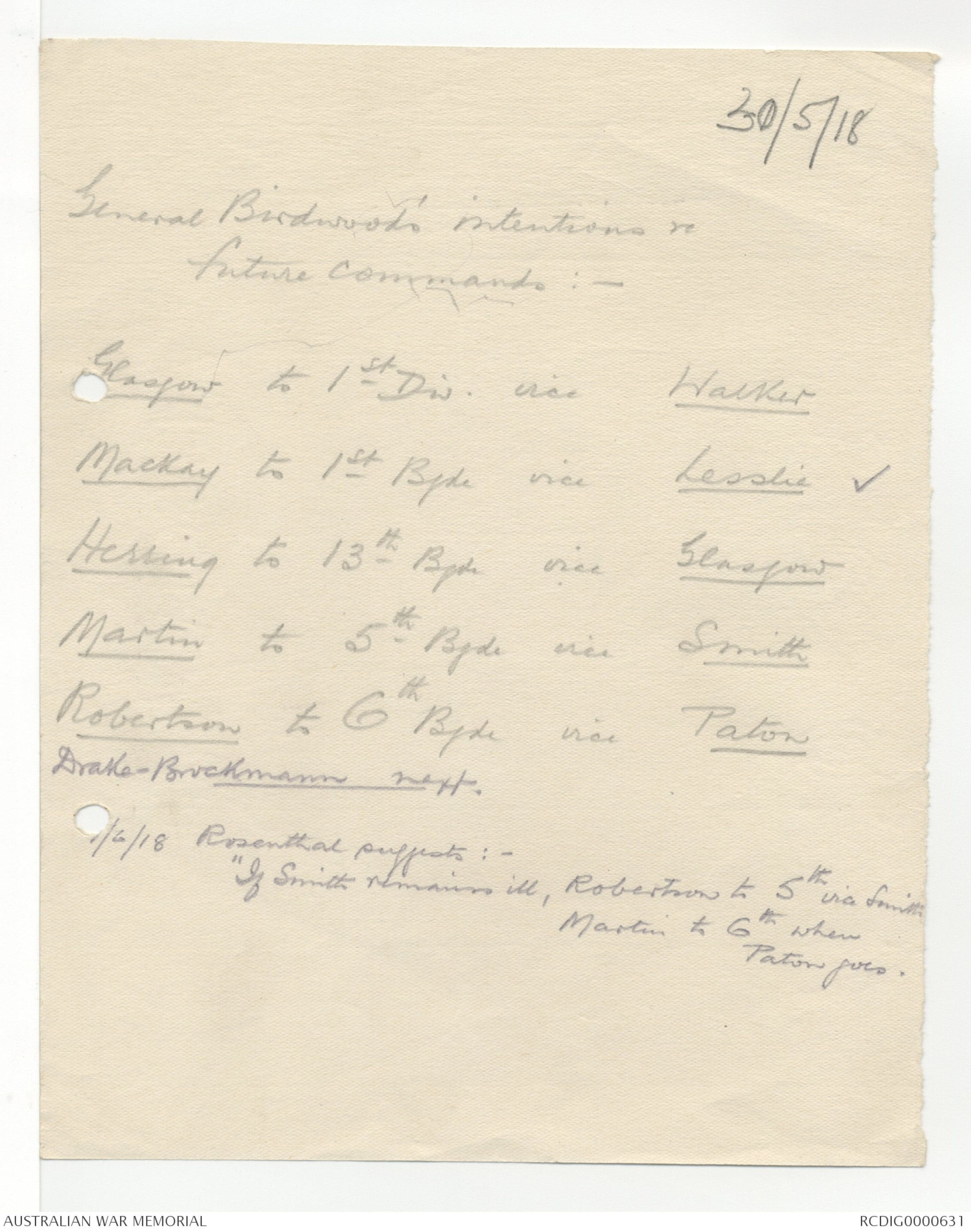
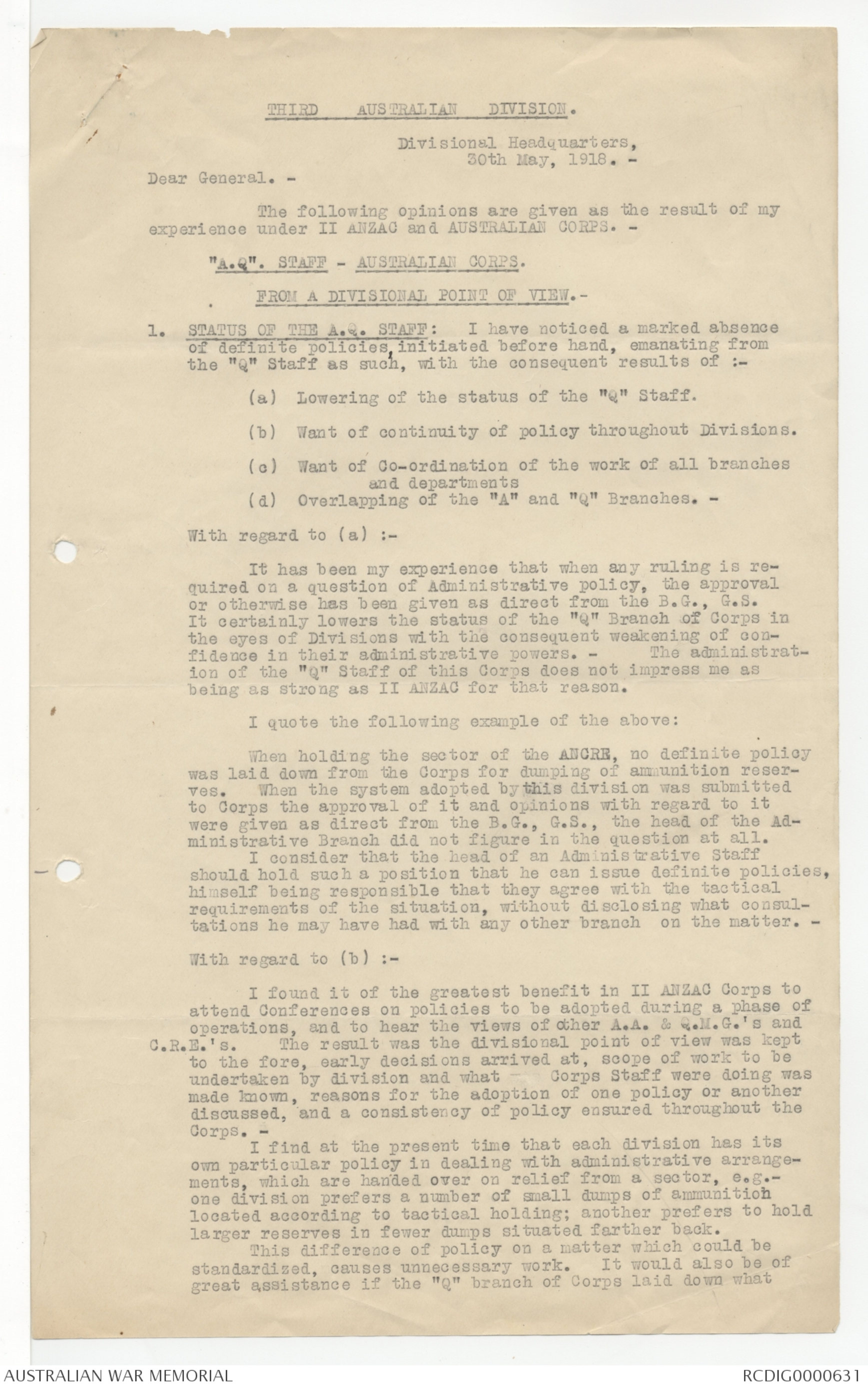
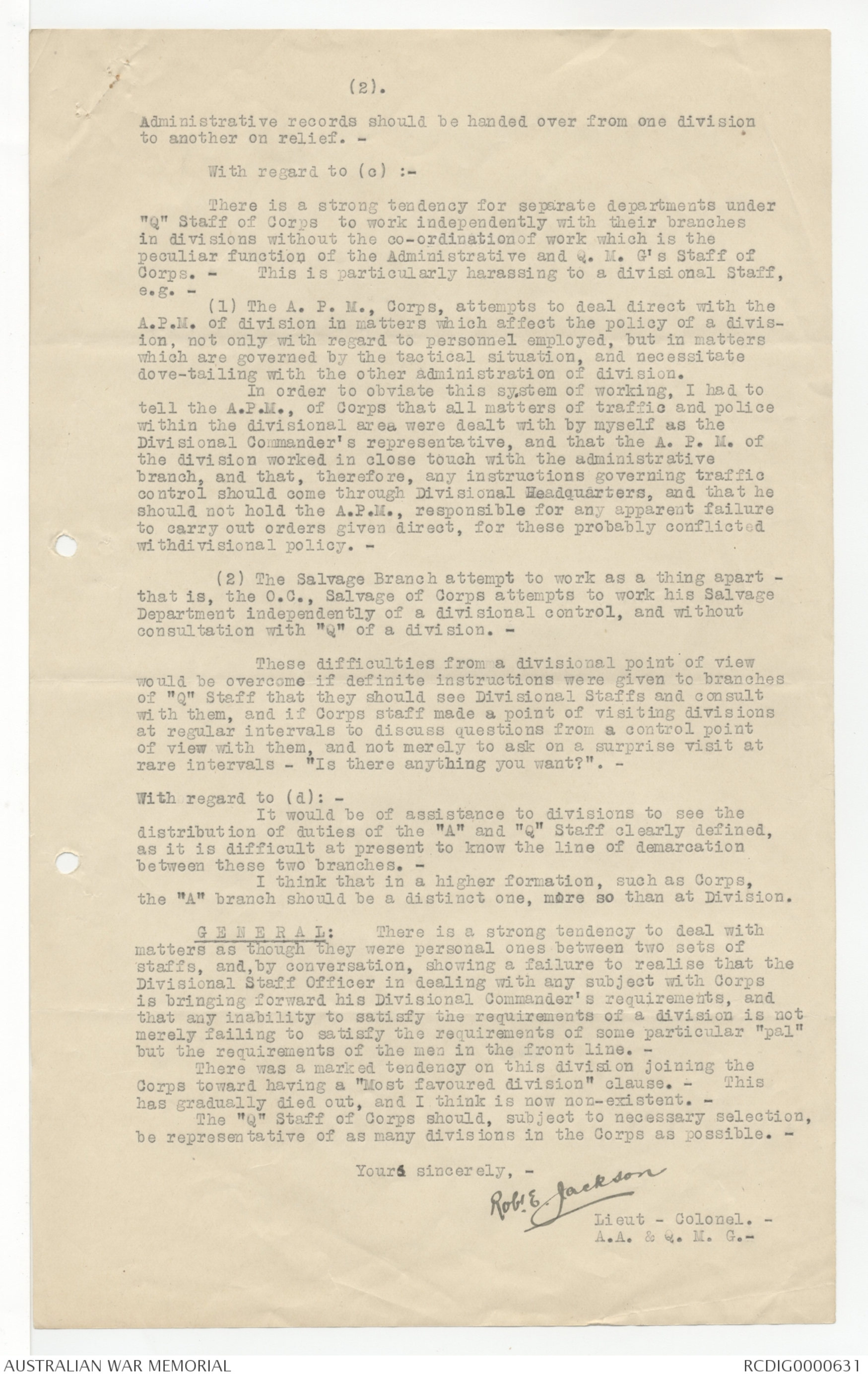
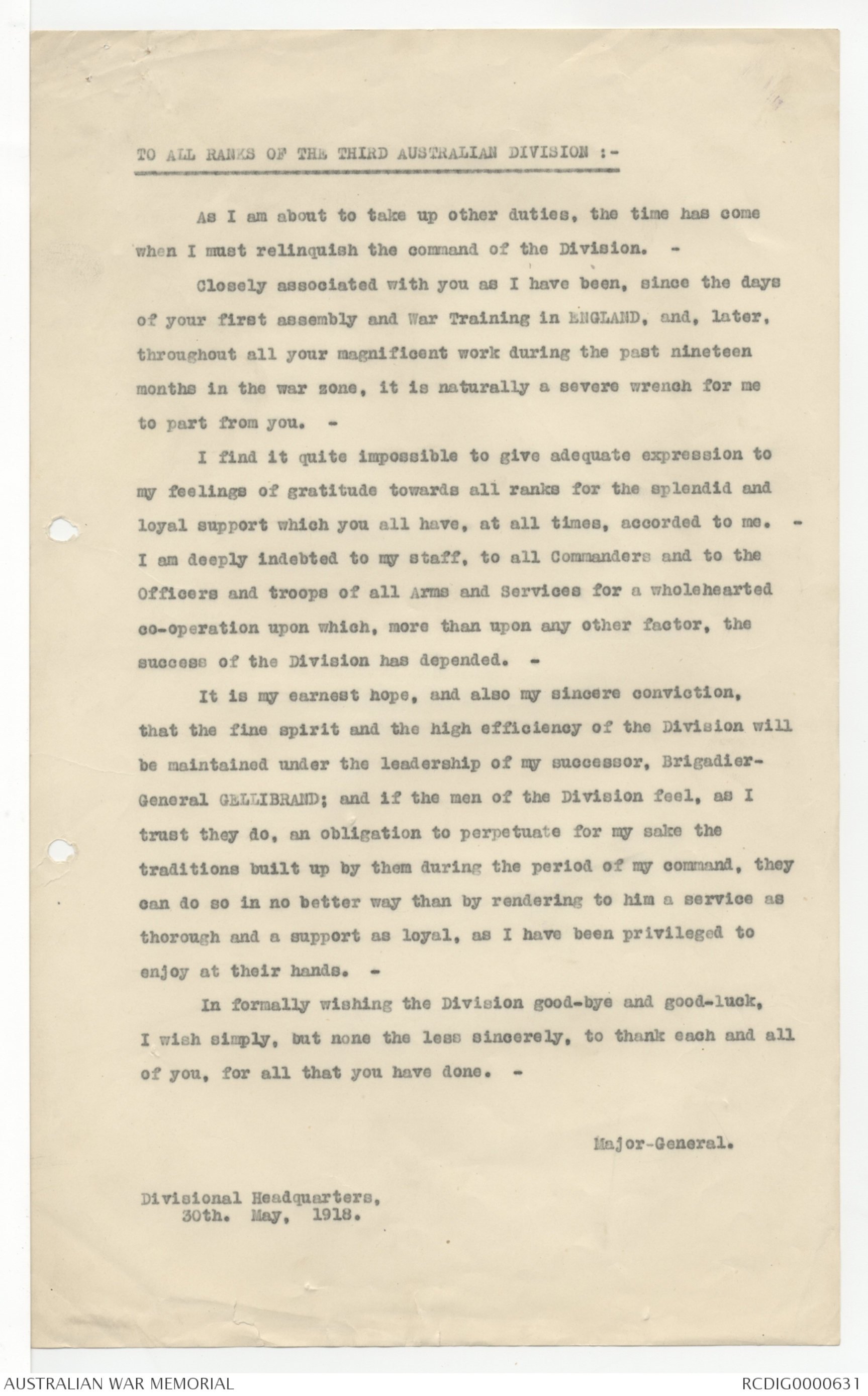
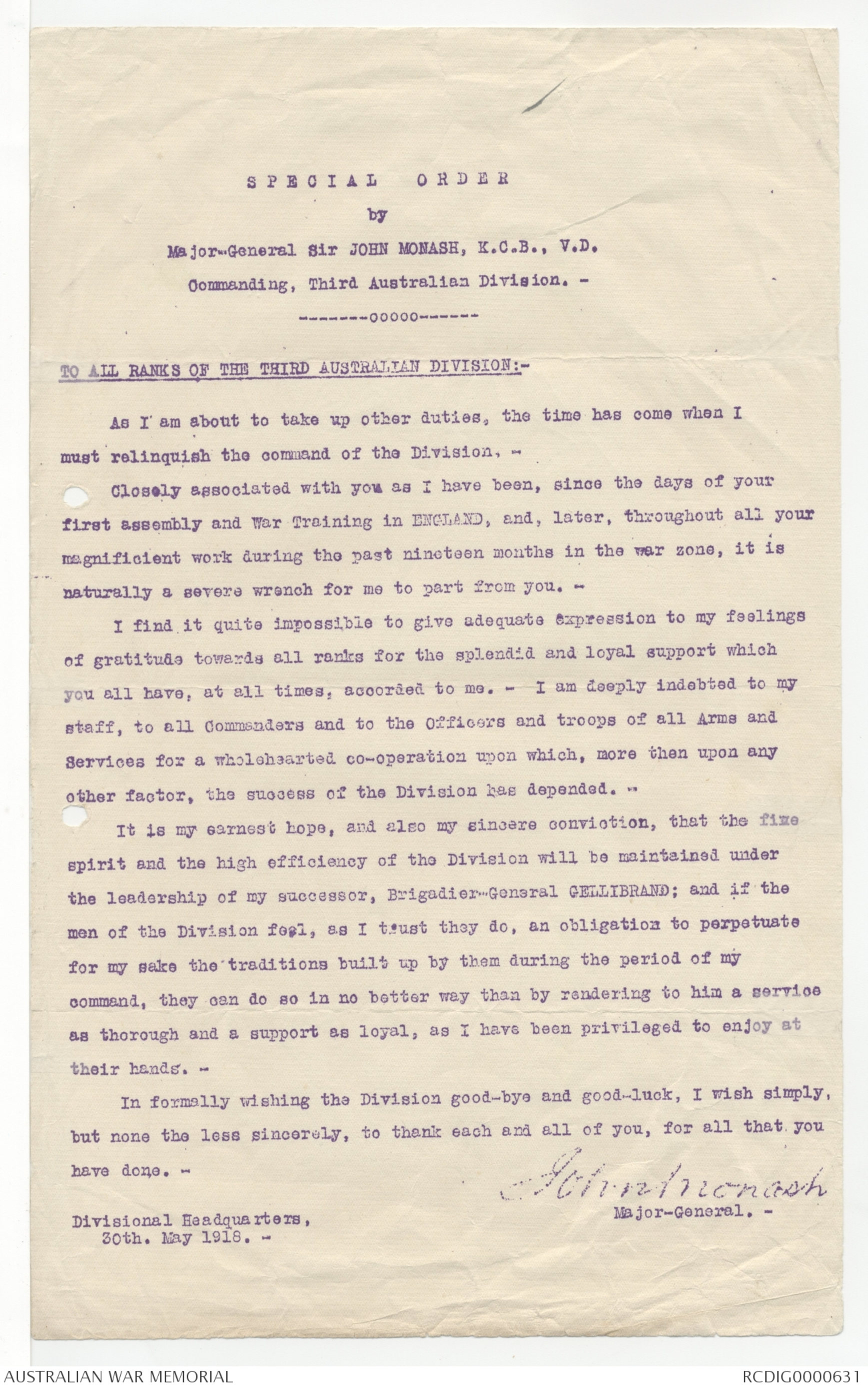
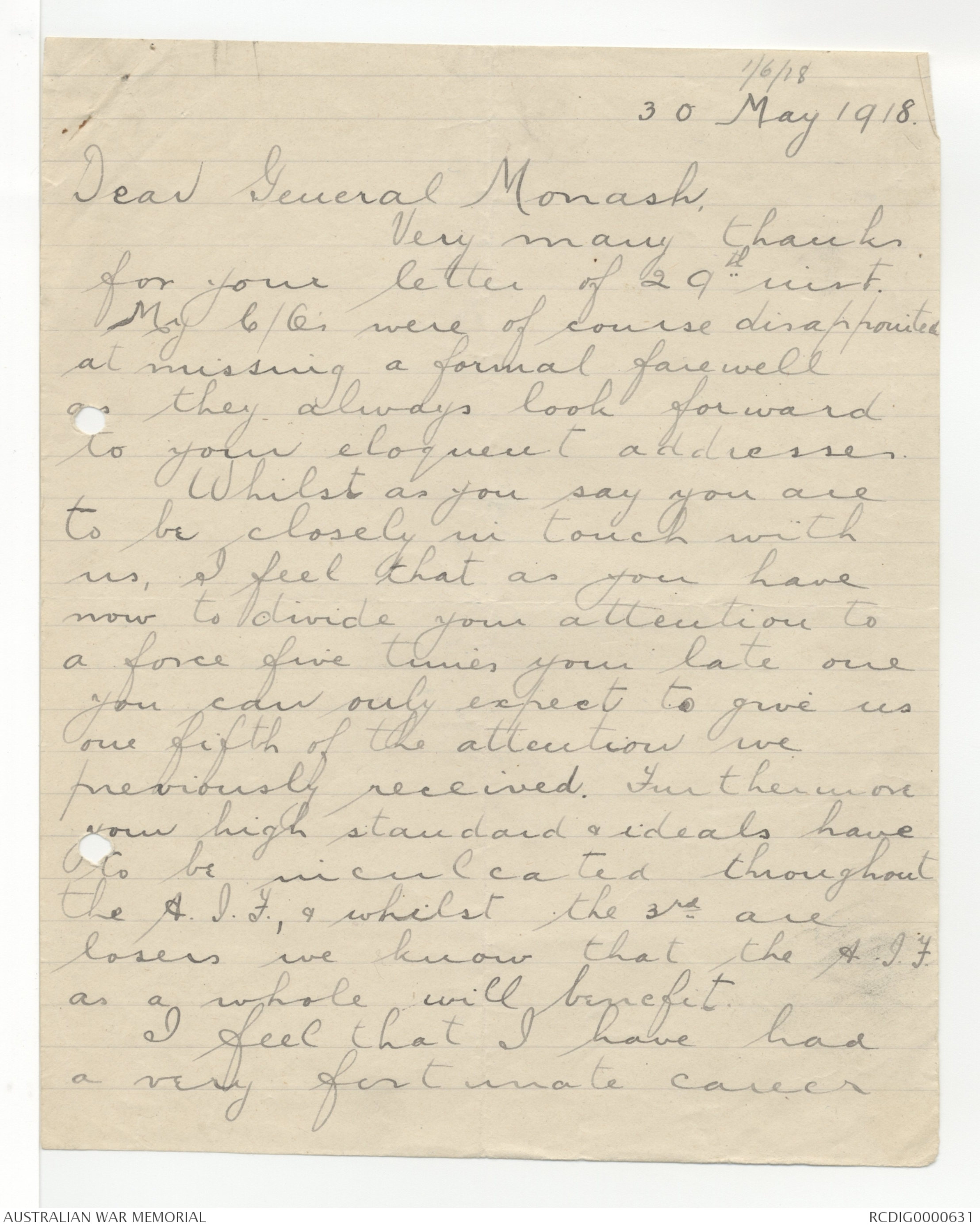
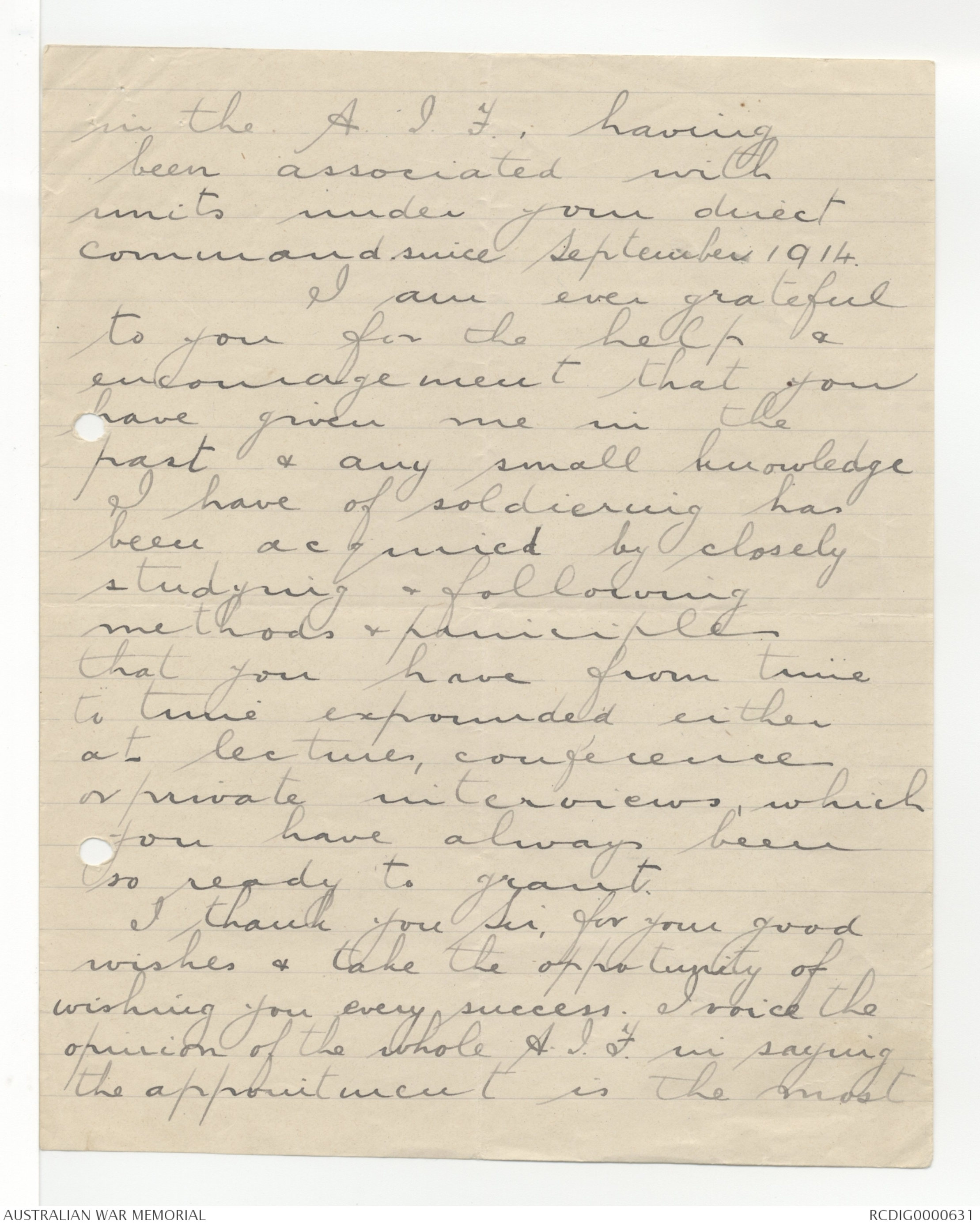
[*HEADQUARTERS
28 MAY. 1918
NO. G42/303
THIRD AUSTRALIAN DIVISION*]
PWP.
(Extract from "Le MATIN" Wednesday, 22nd. May, 1918).
THE BITE OF THE AUSTRALIANS.
The retaking of VILLE-sur- ANCRE.
In one month the Australians have captured 1,800
prisoners and have taken part in numerous
conflicts
(From our Special War Correspondent accredited to the British Army)
Between the SOMME and the ANCRE - 21st May
The AUSTRALIANS are only happy when they are given plenty of hard
work. It was an Australian Captain who, simply, emphasized this
trait in their character, so often exemplified, and he seemed, on
his part, quite satisfied. And quite justly too, for his company
was one of those which, the day before yesterday, on Whitsun Eve,
contributed towards the success which you know resulted in the retaking
of VILLE-sur-ANCRE. It was a splendid surprise blow, sturdily
carried out and it is worth reporting in some detail.
The artillery preparation lasted barely an hour. At 2.0 a.m. the
first AUSTRALIAN wave went over the top.
There was a splendid moon. It was a pleasure to go, the Captain
tells us. Our lengthened shadows as we leapt from hole to hole
running across the country, doubled, in the eyes of the enemy, the
number of his assailants. His barrage was put up too late. The
attack, made on a front of little more than three kilometres, developed
right and left of the village, peat bogs preventing it being
assaulted from the front.
Advanced posts and garrisons - in the neighbourhood of 1,000 men -
found themselves surrounded ere they had a chance to retaliate.
Nevertheless the battalion which held the village - men of the 117th
Division, young classes mostly - notwithstanding the futility of all
resistance, defended themselves valiantly. It took two hours searching
the cellars to overcome, with the aid of bombs, the obstinacy of
some of them. Four hundred prisoners, or but few less, remained in
our hands, and at least as many dead lay on the field. I say enemy
dead, for our own losses were negligible.
One comic incident - which always exists in every drama - was the
finding, amongst the small fry (wastrels) captured, of a civilian
from BERLIN - rara avis - whose sole baggage consisted of a register
of subscriptions, for he was a Collector of War Savings, charged with
receiving on the spot the mites of the combatants. It would appear
on glancing at his notebook, that the liberality of the contributions
was not very considerable.
Another incident, this time of a dramatic nature: we had taken an
officer who, according to custom, had advanced to meet us hands up.
Seizing a moment to drop them, he hastily snatched his revolver from
the pocket of his tunic and fired it point-blank at the stomach of
the guard who was marching at his side. This example of Hunnish
perfidy earned the end it merited.
The taking of VILLE-sur-ANCRE - known by some as VILLE-sous-CORBIE-
has the advantage of securing for us valuable observation direct on
MORLANCOURT, and, amongst other things, on four roads and on the
enemy flank towards ALBERT.
P.T.O.
-2 -
A run of successes.
This success, furthermore, is the last in point of date of a
whole series of fortunate operations which, in the course of a
month, have meant the capture by the AUSTRALIAN CORPS of 1,800
prisoners, of whom half are to the credit of the two brigades
which retook VIILERS-BRETONNEUX.
Hereunder, unembellished but how eloquent, is a statement of
their feats of arms during the past fortnight: -
Night 30th Apl/1st May.
Line advanced 400 metres in depth on a front of 800. Post established
East of the villages of TREUX.
Night of 1st /2nd May.
Further advance - total gain of 600 metres in depth on a front
of 1400 metres.
Morning 6th May.
Capture of the whole German second line of defence
S.W. of MORLANCOURT. The occupants and their ration-carriers
killed or captured. Prisoners 163, including 4 officers.
Morning 8th May.
Three local operations - all successful. Line advanced 500
metres on 600 metres of front East of SAILLY-le-SEC and of 300
metres on 500 metres West of MORLANCOURT. About 20 prisoners
and heavy enemy casualties.
9th. May.
Return of enemy offensive. They secured a footing for an instant
in Australian trenches North-west of ALBERT but were immediately
thrown out again.
14th. May.
Two German Companies belonging to 18th and 199th Divisions attempted
to regain the trenches lost by them south-west of MORLANCOURT.
At one point they broke into the Australian lines. A
spirited counter-attack not only re-established the position, but
lost country to the enemy and left 52 prisoners in our hands as a
result of the encounter.
18th. May.
The Australians attacked, at full midday, a strong post advanced
towards MORLANCOURT, captured the whole garrison - 22 men and 1
officer - and withdrew, having suffered no casualties.
When the Germans think of attacking, this is the kind of
adversary he will have to reckon with.
-Copy-
[*HEADQUARTERS
30 MAY. 1918
No. Q 32/48
THIRD AUSTRALIAN DIVISION
D. A. G.
10/0/83.
A. I. F.*]
A.G.'s. No. Appts./3447
Fourth Army A/1/1263
SECRET.
Headquarters,
Fifth Army "A"
With reference to my Appts./3447 of yesterday, the approval
of the Army Council having been obtained, the following appointments
are approved as a temporary measure :-
(1) General Sir W.R.BIRDWOOD, K.C.B., K.C.S.I., K.C.M.G., C.I.E.,
D.S.O., A.D.C., to command Fifth Army on reconstitution.
(2) Major-General C.B.B.WHITE, C.B., C.M.G., D.S.O., A.D.C., A.I.F.
(now B.G.G.S., Australian Army Corps), to be Major-General,
General Staff, Headquarters, Fifth Army on reconstitution.
(3) Major J.S.S.CHURCHILL, Oxford Hussars (now Camp Commandant,
Australian Army Corps), to be Assistant Military Secretary,
(graded for purposes of pay as D.A.A.G.) Headquarters,
Fifth Army, on reconstitution.
Orders have been issued for the above officers to take up
their appointment. Please report dates of assuming duties.
(S'gd.) H.M.PRYCE-JONES.
Lieut.-Colonel, A.A.G.
for Adjutant-General.
G.H.Q.,
1st. Echelon,
23.5.1918.
-2-
Headquarters,
Australian Corps "A".
For information. Please issue orders accordingly.
The following appointments are also approved :-
(1) Major-General Sir J.MONASH, K.C.B., A.I.F., (now Commanding
3rd. Australian Division), to command Australian Army
Corps, vice General Sir W.R.BIRDWOOD, K.C.B., K.C.S.I.,
K.C.M.G., C.I.E., D.S.O., A.D.C.
(2) Colonel T.A.BLAMEY, C.M.G., D.S.O., A.I.F., (now G.S.O. lst.
Grade, lst. Australian Division), to be Brigadier-General,
General Staff, Headquarters, Australian Army Corps, vice
Major-General C.B.B.WHITE, C.B., C.M.G., D.S.O., A.D.C.,AIF.
Please issue orders for Major-General Monash accordingly
and report to this office the dates he and Colonel Blamey (for whom
orders have been issued) assume duties.
(s'gd.) H. M.Pryce-Jones'
Lieut.-Colonel, A.A.G.
for Adjutant-General
G.H.Q.,
1st Echelon,
25.3.1918
-2-
Headquarters,
Australian Corps "A"
For information. Please issue orders accordingly.
The following appointments are also approved :-
(1) Major-General Sir J. MONASH, K.C.B., A.I.F., (now Commanding
3rd. Australian Division), to command Australia Army
Corps, vice General Sir W.R. Birdwood. K.C.B., K.C.S.I.,
K.C.M.G., C.I.E., D.S.C., A.D.C
(2) Colonel T.A. Blamey C.M.G., D.S.C., A.I.F (now G.S.C.1st
Grade, 1st. Australian Division), to be Brigadier-General,
General Staff, Headquarters, Australian Army Corps, vice
Major-General C.B.B. WHITE, C.B., C.M.G. , D.S.C., A.D.C., A.I.F.
Please issue orders for Major-General Monash accordingly
and report to this office the dates he and Colonel Blamey (for whom
orders have been issued) assume duties.
(S'gd.) H. Parole Capt.
Staff Captain
for Lieut.-Colonel
A.A.G., Fourth Army.
Headquarters,
Fourth Army,
24.5.1918.
Urgent
-3-
Headquarters,
3rd. AUSTRALIAN DIVISION.
For your information.
H.Q., A.I.F.
29.5.1918.
TH. Dodds
Colonel.
D.A.G., A.I.F
30/5/18
General Birdwood's intentions re
future commands :-
Glasgow to 1st Div. vice Walker
Mackay to 1st Bgde vice Lesslie √
Herring to 13th Bgde vice Glasgow
Martin to 5th Bgde vice Smith
Robertson to 6th Bgde vice Paton
Drake-Brockmann next
[[?]]/6/18 Rosenthal suggests :-
"If Smith remains ill, Rosenthal to 5th vice Smith
Martin to 6th when Paton goes.
THIRD AUSTRALIAN DIVISION.
Divisional Headquarters,
30th May, 1918. -
Dear General. -
The following opinions are given as the result of my
experience under II ANZAC and AUSTRALIAN CORPS. -
"A.Q". STAFF - AUSTRALIAN CORPS.
FROM A DIVISIONAL POINT OF VIEW.-
1. STATUS OF THE A.Q. STAFF: I have noticed a marked absence
of definite policies, initiated before hand, emanating from
the "Q" Staff as such, with the consequent results of :-
(a) Lowering of the status of the "Q" Staff.
(b) Want of continuity of policy throughout Divisions.
(c) Want of Co-ordination of the work of all branches
and departments
(d) Overlapping of the "A" and "Q" Branches. -
With regard to (a) :-
It has been my experience that when any ruling is required
on a question of Administrative policy, the approval
or otherwise has been given as direct from the B.G., G.S.
It certainly lowers the status of the "Q" Branch of Corps in
the eyes of Divisions with the consequent weakening of confidence
in their administrative powers. - The administration
of the "Q" Staff of this Corps does not impress me as
being as strong as II ANZAC for that reason.
I quote the following example of the above:
When holding the sector of the ANCRE, no definite policy
was laid down from the Corps for dumping of ammunition reserves.
When the system adopted by this division was submitted
to Corps the approval of it and opinions with regard to it
were given as direct from the B.G., G.S., the head of the Administrative
Branch did not figure in the question at all.
I consider that the head of an Administrative Staff
should hold such a position that he can issue definite policies,
himself being responsible that they agree with the tactical
requirements of the situation, without disclosing what consultations
he may have had with any other branch on the matter. -
With regard to (b) :-
I found it of the greatest benefit in II ANZAC Corps to
attend Conferences on policies to be adopted during a phase of
operations, and to hear the views of other A.A. & Q.M.G.'s and
C.R.E.'s. The result was the divisional point of view was kept
to the fore, early decisions arrived at, scope of work to be
undertaken by division and what Corps Staff were doing was
made known, reasons for the adoption of one policy or another
discussed, and a consistency of policy ensured throughout the
Corps. -
I find at the present time that each division has its
own particular policy in dealing with administrative arrangements,
which are handed over on relief from a sector, e.g.-
one division prefers a number of small dumps of ammunition
located according to tactical holding; another prefers to hold
larger reserves in fewer dumps situated farther back.
This difference of policy on a matter which could be
standardized, causes unnecessary work. It would also be of
great assistance if the "Q" branch of Corps laid down what
(2).
Administrative records should be handed over from one division
to another on relief. -
With regard to (c) :-
There is a strong tendency for separate departments under
"Q" Staff of Corps to work independently with their branches
in divisions without the co-ordination of work which is the
peculiar function of the Administrative and Q.M.G's Staff of
Corps. - This is particularly harassing to a divisional Staff,
e.g. -
(1) The A.P.M., Corps, attempts to deal direct with the
A.P.M. of division in matters which affect the policy of a division,
not only with regard to personnel employed, but in matters
which are governed by the tactical situation, and necessitate
dove-tailing with the other administration of division.
In order to obviate this system of working, I had to
tell the A.P.M., of Corps that all matters of traffic and police
within the divisional area were dealt with by myself as the
Divisional Commander's representative and that the A.P.M. of
the division worked in close touch with the administrative
branch, and that, therefore, any instructions governing traffic
control should come through Divisional Headquarters, and that he
should not hold the A.P.M., responsible for any apparent failure
to carry out orders given direct, for these probably conflicted
withdivisional policy. -
(2) The Salvage Branch attempt to work as a thing apart -
that is, the O.C., Salvage of Corps attempts to work his Salvage
Department independently of a divisional control, and without
consultation with "Q" of a division. -
These difficulties from a divisional point of view
would be overcome if definite instructions were given to branches
of "Q" Staff that they should see Divisional Staffs and consult
with them, and if Corps staff made a point of visiting divisions
at regular intervals to discuss questions from a control point
of view with them, and not merely to ask on a surprise visit at
rare intervals - "Is there anything you want?". -
With regard to (d): -
It would be of assistance to divisions to see the
distribution of duties of the "A" and "Q" Staff clearly defined,
as it is difficult at present to know the line of demarcation
between these two branches. -
I think that in a higher formation, such as Corps,
the "A" branch should be a distinct one, more so than at Division.
GENERAL: There is a strong tendency to deal with
matters as though they were personal ones between two sets of
staffs, and, by conversation, showing a failure to realise that the
Divisional Staff Officer in dealing with any subject with Corps
is bringing forward his Divisional Commander's requirements, and
that any inability to satisfy the requirements of a division is not
merely failing to satisfy the requirements of some particular "pal"
but the requirements of the men in the front line. -
There was a marked tendency on this division joining the
Corps toward having a "Most favoured division" clause. - This
has gradually died out, and I think is now non-existent. -
The "Q" Staff of Corps should, subject to necessary selection,
be representative of as many divisions in the Corps as possible. -
Yours sincerely,
Robt. E. Jackson
Lieut - Colonel. -
A.A. & Q.M.G.-
TO ALL RANKS OF THE THIRD AUSTRALIAN DIVISION :–
As I am about to take up other duties, the time has come
when I must relinquish the command of the Division. -
Closely associated with you as I have been, since the days
of your first assembly and War Training in ENGLAND, and, later,
throughout all your magnificent work during the past nineteen
months in the war zone, it is naturally a severe wrench for me
to part from you. -
I find it quite impossible to give adequate expression to
my feelings of gratitude towards all ranks for the splendid and
loyal support which you all have, at all times, accorded to me. -
I am deeply indebted to my staff, to all Commanders and to the
Officers and troops of all Arms and Services for a wholehearted
co-operation upon which, more than upon any other factor, the
success of the Division has depended. -
It is my earnest hope, and also my sincere conviction,
that the fine spirit and the high efficiency of the Division will
be maintained under the leadership of my successor, Brigadier-General
GELLIBRAND; and if the men of the Division feel, as I
trust they do, an obligation to perpetuate for my sake the
traditions built up by them during the period of my command, they
can do so in no better way than by rendering to him a service as
thorough and a support as loyal, as I have been privileged to
enjoy at their hands. -
In formally wishing the Division good-bye and good-luck,
I wish simply, but none the less sincerely, to thank each and all
of you, for all that you have done. -
Major-General.
Divisional Headquarters,
30th. May, 1918.
SPECIAL ORDER
by
Major-General Sir JOHN MONASH, K.C.B., V.D.
Commanding, Third Australian Division. -
TO ALL RANKS OF THE THIRD AUSTRALIAN DIVISION: -
As I am about to take up other duties, the time has come when I
must relinquish the command of the Division. -
Closely associated with you as I have been, since the days of your
first assembly and War Training in ENGLAND, and, later, throughout all your
magnificent work during the past nineteen months in the war zone, it is
naturally a severe wrench for me to part from you. -
I find it quite impossible to give adequate expression to my feelings
of gratitude towards all ranks for the splendid and loyal support which
you all have, at all times, accorded to me. - I am deeply indebted to my
staff, to all Commanders and to the Officers and troops of all Arms and
Services for a wholehearted co-operation upon which, more then upon any
other factor, the success of the Division has depended. --
It is my earnest hope, and also my sincere conviction, that the fine
spirit and the high efficiency of the Division will be maintained under
the leadership of my successor, Brigadier-General GELLIBRAND; and if the
men of the Division feel, as I trust they do, an obligation to perpetuate
for my sake the traditions built up by them during the period of my
command, they can do so in no better way than by rendering to him a service
as thorough and a support as loyal, as I have been privileged to enjoy at
their hands.-
In formally wishing the Division good-bye and good-luck, I wish simply,
but none the less sincerely, to thank each and all of you, for all that you
have done. -
John Monash
Major-General. -
Divisional Headquarters,
30th. May 1918. -
1/6/18
30 May 1918.
Dear General Monash,
Very many thanks
for your letter of 29th inst.
My C/Os were of course disappointed
at missing a formal farewell
as they always look forward
to your eloquent addresses
Whilst as you say you are
to be closely in touch with
us, I feel that as you have
now to divide your attention to
a force five times your late one
you can only expect to give us
one fifth of the attention we
previously received. Furthermore
your high standard & ideals have
to be inculcated throughout
the A.I.F., & whilst the 3rd are
losers we know that the A.I.F.
as a whole will benefit.
I feel that I have had
a very fortunate career
in the A.I.F., having
been associated with
units under your direct
command since September 1914.
I am ever grateful
to you for the help &
encouragement that you
have given me in the
past & any small knowledge
I have of soldiering has
been acquired by closely
studying & following
methods & principles
that you have from time
to time expounded either
at lectures, conferences
or private interviews, which
you have always been
so ready to grant.
I thank you Sir, for your good
wishes & take the opportunity of
wishing you every success. I voice the
opinion of the whole A.I.F. in saying
the appointment is the most
 Transcriber 6897
Transcriber 6897This transcription item is now locked to you for editing. To release the lock either Save your changes or Cancel.
This lock will be automatically released after 60 minutes of inactivity.